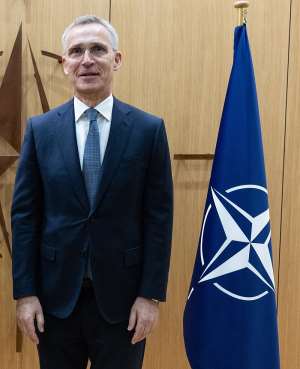
At the 75th anniversary of NATO in Brussels, Jens Stoltenberg, the Secretary General of the military alliance, delivered a poignant reminder: the United States needs more allies now more than ever. Stoltenberg underscored the vital role of European allies in bolstering North American security, emphasizing the reciprocal nature of transatlantic relations. His remarks, while timely and diplomatically crafted, carried weight beyond mere rhetoric, resonating against the backdrop of geopolitical shifts and evolving security challenges.
Implicit within Stoltenberg’s message lies a subtle critique of former President Trump’s rhetoric, particularly his cavalier suggestion of allowing Russia to act unchecked against NATO members failing to meet financial commitments. Stoltenberg’s articulation subtly reasserts the enduring importance of collective defense and alliance cohesion, undoubtedly a relief to NATO members unsettled by Trump’s unpredictability. Yet, beneath the surface, it sends a clear message to adversaries like President Putin: the United States remains steadfast in its commitment to collective security, with or without Trump’s endorsement.
But why does the US need NATO? The answer lies in the fundamental principles that underpin the alliance and the tangible benefits it provides for American interests. NATO offers the United States a robust framework for collective defense. Article 5 of the NATO treaty enshrines the principle that an attack on one member constitutes an attack on all, thereby mandating a collective response. This ensures that the United States is not alone in facing security threats, leveraging the combined strength of its allies to deter potential adversaries. The invocation of Article 5 following the September 11, 2001, terrorist attacks demonstrated NATO’s unwavering commitment to stand by the US in times of crisis, showcasing the alliance’s relevance in today’s security landscape.
Beyond collective defense, NATO contributes to strategic stability, particularly in Europe. Through its alliances and partnerships, NATO fosters regional stability, thereby enhancing global security. The presence of US forces in Europe, under NATO auspices, serves as a deterrent against aggression, preventing conflicts and promoting peace in the region. For example, NATO’s engagement in the Balkans has been instrumental in stabilizing the region post-conflict, preventing further violence and fostering reconciliation among ethnic groups.
NATO also plays a crucial role in counterterrorism efforts. In an era of transnational threats, NATO’s collaborative approach to combating terrorism is indispensable. Through intelligence sharing, joint military operations and capacity-building initiatives, NATO enhances the United States’ ability to counter terrorist threats effectively. The Resolute Support Mission in Afghanistan exemplified NATO’s commitment to addressing terrorism and supported the Afghan security forces in their fight against groups like the Taliban and al-Qaeda.
Furthermore, NATO promotes interoperability and defense innovation, enhancing the effectiveness of multinational military operations. By standardizing equipment, procedures and training, NATO facilitates seamless cooperation among member states, maximizing the collective defense posture. Besides, initiatives like Smart Defense encourage resource pooling and technological collaboration, promoting efficiency and cost-effectiveness in defense capabilities.
In conclusion, NATO remains an indispensable cornerstone of US foreign policy and national security strategy. As Jens Stoltenberg aptly highlighted, the United States needs more allies now more than ever. In an increasingly complex and interconnected world, NATO provides the framework for collective action, ensuring that the United States is not alone in confronting evolving security challenges. In reaffirming its commitment to NATO, the United States reaffirms its enduring dedication to the principles of collective security and alliance solidarity.
Richmond Acheampong is a communication specialist, consultant, independent journalist and columnist. He holds a PhD in Journalism. He can be contacted through [email protected]




 Ensure private schools employ professional teachers, not SHS graduates — Xandy K...
Ensure private schools employ professional teachers, not SHS graduates — Xandy K...
 Alan Kyeremanten was the brain behind Ghana Card not Bawumia — Hopeson Adorye
Alan Kyeremanten was the brain behind Ghana Card not Bawumia — Hopeson Adorye
 I'm not running for office for power prestige, I just want to solve Ghana’s prob...
I'm not running for office for power prestige, I just want to solve Ghana’s prob...
 Provide immediate assistance to our displaced residents — Oda Nkwanta residents ...
Provide immediate assistance to our displaced residents — Oda Nkwanta residents ...
 Send nurses abroad; it’s a better option than being unemployed in Ghana — NDC Pa...
Send nurses abroad; it’s a better option than being unemployed in Ghana — NDC Pa...
 Bawumia stole free tertiary education for Persons with Disabilities from NDC’s 2...
Bawumia stole free tertiary education for Persons with Disabilities from NDC’s 2...
 Ejisu by-election: Anger is bound to occur but return to your 'sweet home' — Nan...
Ejisu by-election: Anger is bound to occur but return to your 'sweet home' — Nan...
 Limited voters registration: Don't allow politicians to engage your minors for p...
Limited voters registration: Don't allow politicians to engage your minors for p...
 Ferry on Oti River breaks down; drivers and passengers stranded
Ferry on Oti River breaks down; drivers and passengers stranded
